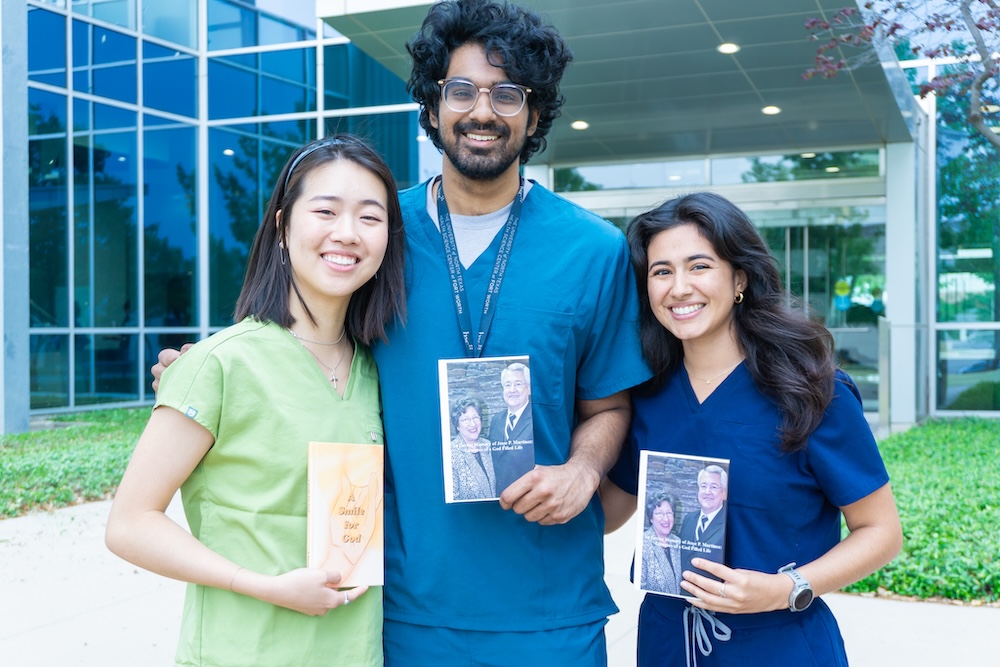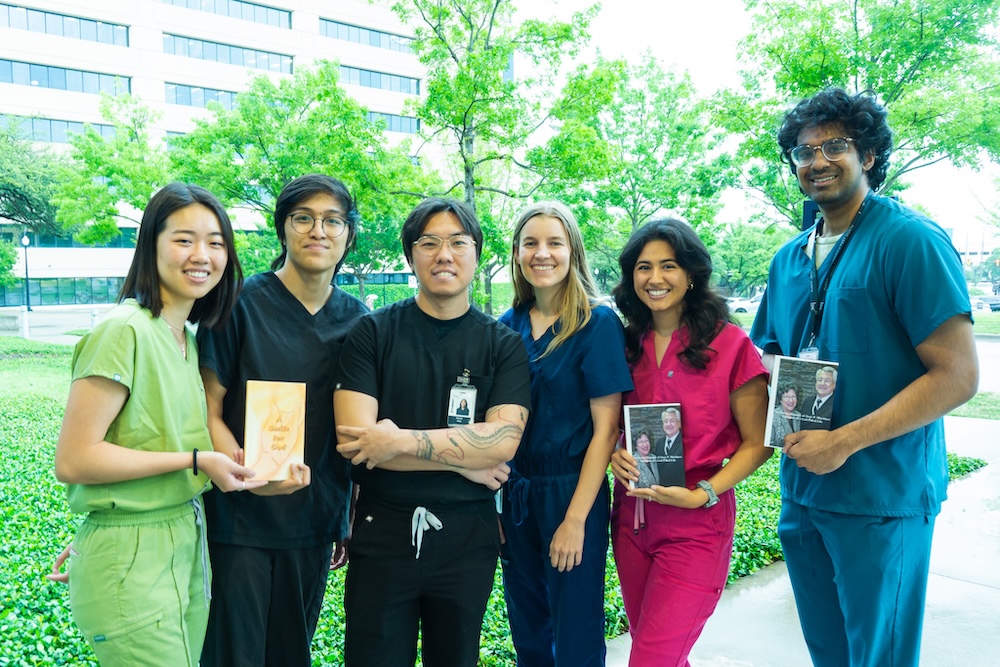Thursday, June 12, 2025
When Azelia Lau arrived at the Texas College of Osteopathic Medicine at The University of North Texas Health Science Center at Fort Worth, she brought more than a passion for psychiatry. She also carried a long-held idea inspired by an undergraduate program she never got to join.
Now a third-year medical student, Lau launched Legacy Writers, a student-led initiative under the Psychiatry Interest Group at UNTHSC. The program pairs medical students with hospice patients to preserve their life stories through memoirs.
With support from Community Healthcare of Texas and its volunteer coordinator, Melissa Brannon, students recently completed and published three memoirs for patients in hospice care.
“Their curiosity, empathy and dedication brought a fresh and respectful perspective to capturing each unique journey,” Brannon said. “It was inspiring to witness the meaningful connections formed as students listened with intention and helped give voice to stories that might otherwise go untold.”

UNTHSC's Texas College of Osteopathic Medicine students and Legacy Writers, from left to right Azelia Lau, Annish Reddy and Hannah Rey
Each memoir took shape through interviews with patients and family members. The students did not follow a chronological structure; instead, they focused on themes like purpose, resilience and love. Some students met with their patients only once or twice, yet the emotional connection was powerful.
“It was surprising how deeply we could connect with someone in just two meetings,” Lau said. “After one of our patients passed, I realized I knew so much about him but had so little time with him. The loss was real.”
Second-year student Anish Reddy said the project became more than an academic experience. It became a relationship.
“Even now, my patient still calls me just to talk,” Reddy said. “Toward the end of the memoir process, he told me I felt like a son to him. That moment reminded me why I chose medicine. It brought me back to my ‘why.’”
Reddy and his writing partner, Hannah Rey, took turns interviewing, recording and
shaping the patient’s stories. Their patient, a devoted husband and father, found
comfort in the process.
“Storytelling was therapeutic for him,” Rey said. “He reflected on his past, processed
his emotions and left a tangible piece of himself for his family.”
Destny Agubuzo, another Legacy Writer, said the experience reminded her that medical care should go beyond clinical treatment.
“This showed me how human medicine really is,” Agubuzo said. “We focus so much on symptoms, but this reminded me that healing also comes through connection and knowing someone’s heart.”
She recalled the moment her patient, who had once mistaken vulnerability for weakness but grew to appreciate it as a human strength, became emotional when speaking about his family and faith.
“While reminiscing. He fondly shed tears during our interviews,” Agubuzo said. “It taught me that strength looks like a willingness to be vulnerable.”
Dsc01358
2024-25 Legacy Writers
Students received mentorship and training from Susan Franks, PhD, ABPP, a clinical health psychologist and associate professor in the Department of Family Medicine and Osteopathic Manipulative Medicine. Franks said she was struck by the students’ passion and emotional commitment to the work.

UNTHSC's TCOP's 2024-25 Legacy Writers
“They didn’t just invest their time; they invested their emotional energy,” Franks said. “They showed the best of what osteopathic medicine brings to ‘caring’ — connecting deeply and genuinely with patients through a shared narrative with warmth, empathy and compassion.”
Franks, who helped students develop empathetic interview strategies and guided them in handling complex end-of-life conversations, praised Lau’s leadership.
“Azelia came very well-prepared. She had already reached out to a hospice partner and had a thoughtful list of questions about training students and shaping memoirs,” Franks said. “She worked so hard on this, but I could tell it was truly a labor of love.”
The collaboration with Community Healthcare of Texas, Franks added, helped students experience the emotional and psychological dimensions of patient care beyond the classroom.
“It’s a great example of how UNTHSC can partner with community organizations in a way that benefits both the students and the patients,” she said. “These are the kinds of meaningful, real-world experiences that can’t be taught from a book.”
To print the books, students used Barnes & Noble Press and received partial funding from the Psychiatry Interest Group. Each family received
a free copy, and students delivered them in person.
“These books are a tangible piece of their loved one’s heart,” Rey said. “I can imagine
the families picking them up years from now, reading stories in their loved one’s
voice, and feeling close again.”
As Lau prepares to begin her clinical rotations, leadership of Legacy Writers is being
passed to a new team of second-year students who plan to expand the program and involve
more peers.
Franks believes the experience will continue to shape the kind of physicians these
students become.
“Projects like these bring focus back to the humanity of both the patient and the provider,” she said. “It’s a powerful reminder of the kind of care we want our students to deliver — humanistic, patient-centered and grounded in empathy.”
“If you have an idea and you’re passionate about it, it can happen,” Lau said. “This project showed me that even with the weight of medical school, there’s room to do something meaningful and to build something that lasts.”
In the quiet space between medicine and memory, the Legacy Writers are finding their purpose — not just to heal, but to listen, to write and to honor the lives that shape them.
From HSC Newsroom - Community by Nicole Luna